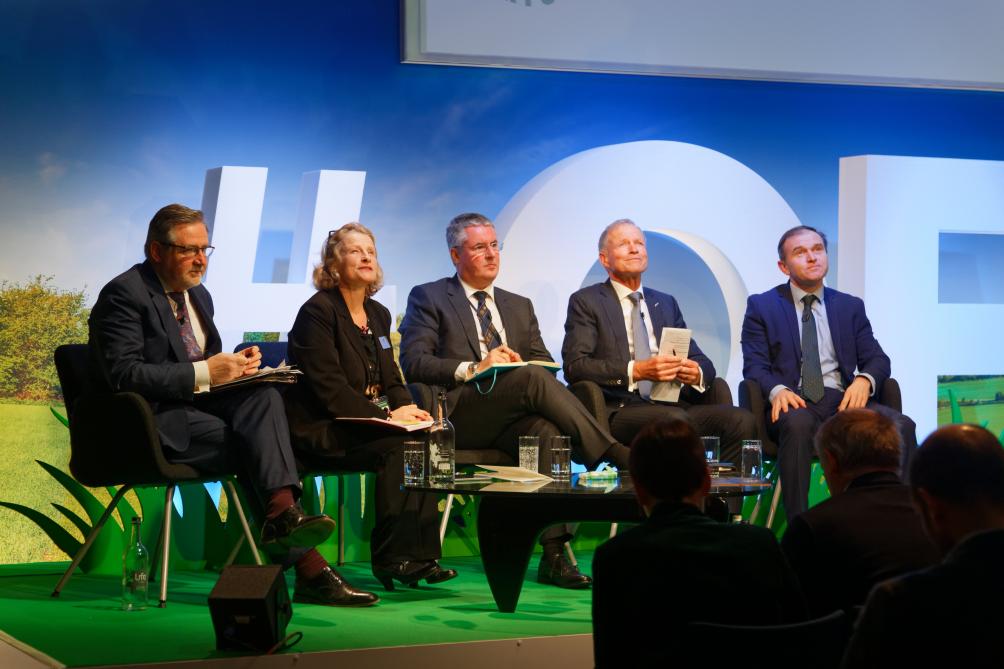What should trading look like post-Brexit?
4th January 2019 by OFC Press Team

The best way for the UK government to secure a prosperous trading future for its farmers was a moot point among the four speakers from business and politics as 29th March looms.
Farming minister George Eustice focused on the "lucrative" export opportunities of developing markets, but as much on the opportunity for UK farmers to substitute imports, excluding competitors such as Irish beef and Dutch pork. Mr Eustice predicts that there will be a deal, but not the current one on the table and that there will most likely be a 'managed approach' come the end of March for continued trade. He would like to see a deal which works closely with EU, with no border checks, but also allows the UK to be free to trade with the rest of the world.
"We didn't want to be told what to do by other countries, so this is our chance to make our own decisions," he said.
Mr Eustice reassured NFU Cymru President, John Davies, that Welsh farmers would not be competing with hormone-treated beef as this has been banned in the proposed deal and would need legislation to be overturned in Parliament.
"It would be unlawful for hormone treated beef to be allowed into the UK," he said.
Labour MP Barry Gardiner showed his deep concern about the government compromising the UK's high food standards through trade deals with nations with different tolerance levels. Referring to the US's 'defects allowance', "which includes 3% of rat droppings", the Shadow Secretary of State for International Trade and Climate Change argued that poor trade deals were not only unethical and unhealthy but will have significant economic impact.
"We are right on the border of our trading neighbours: 44% of our exports and 53% of our trade is with the EU. The most important trading agreement is with our largest trading block, the EU."
He said, however, that there is nothing stopping the UK from doing free trade deals around the world. The Germans are doing five times more business that the UK with China, not because they have a free trade deal but because the government supports it.
On the question of public goods, he said the main consideration is whether these subsidies distort the market.
"61% of profit is coming from public subsidy, currently. In some livestock businesses this can be up to 90% of the business profitability, herein there are some issues surrounding market distortion."
Sir Lockwood Smith, former New Zealand trade minister and High Commissioner to the UK, argued that market regulation was more critical than government regulation. He cited the wine trade in New Zealand, which has thrived since subsidies were withdrawn, not because it is regulated but because it is recognised as a good product.
"New Zealand didn’t used to be market driven, the whole focus was on market subsidies. Farmers in New Zealand didn’t want to get rid of subsidies. Today not one of them want to go back to subsidies."
Sheep meat export has also adapted to the withdrawal of subsidies in 1989. It has the same output now with 27.5m sheep as it did with 70m sheep in 1989, driven by need and the market, Sir Lockwood said, it now makes 42 products from one lamb.
In response to concern about the number of farmers that would be affected by no subsidy, Sir Lockwood said that in New Zealand only 1% of farmers went out of business when subsidies ended, and a further 4% left farming in the next few years, contrary to the prediction of one in five.
With his experience of global trade, he warned against making quick, nasty deals that the UK would regret, but urged the UK to put the emphasis on considered multilateral deals.
"The first bilateral deal you need is the world's best trade deal with the European Union. You already a custom's deal in place, so there is a good starting point in contrast to New Zealand's free trade deal with China which started with nothing."
Although, he warned, "it’s a nonsense to stay in the customs union if you are not a member of the EU. The only way the UK can win is to leave the custom's union.
"The UK’s global trade strategy should be built towards trade liberalisation.You have a two year transition, you should be able to draw up a free trade agreement in that time."
Mark Clark, who runs farmer-owned cooperative Grampian Growers and is also chair of Scotland's co-op's experts, SAOS, urged collaboration and market differentiation. He believes there is a massive opportunity through cooperation and collaboration for the future, as Ireland has done with their red meat sector.
"It’s very difficult for an upland beef or sheep farmer to have a voice, which is why cooperation is so powerful. Take the Dutch bulb growers. We know that we can compete on a global stage with some of our products, but not all.
"We need to be market driven."
Watch the full presentations here:
This session was sponsored by Openfield.
